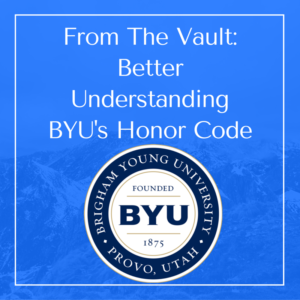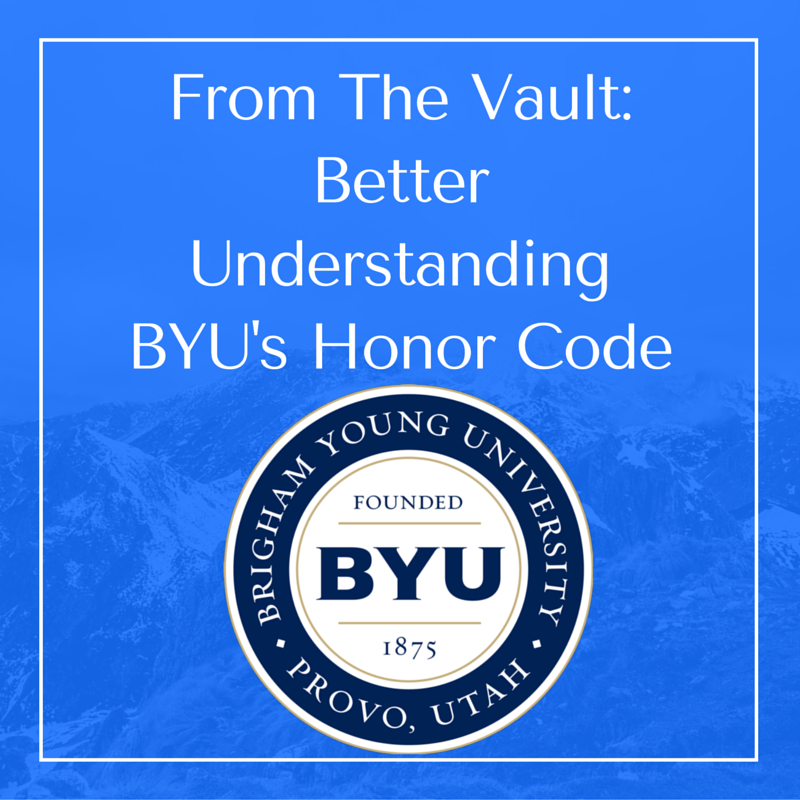Back in 2013 I wrote for The Student Review.
One of the stories I wrote was about the Honor Code. I spoke to representatives from each of the three BYU campuses (Provo, Rexburg & Laie) in order to get a better idea for how it worked.
The Student Review is basically defunct and they deleted most of their old content.
Luckily for me, I was able to find a copy of the article in my old emails.
Below is the article I wrote summing up what I learned about the Honor Code and how they go about looking into cases brought to their attention.
It’s important to remember that this was written back in 2013. Things might have changed, things might not have.
I thought it’d be worth reposting in lieu of the rape story that has been making thee rounds in the Bloggernacle.

Whether it’s a basketball player having premarital sex or two guys holding hands, BYU is often mentioned in the press for what many non-Mormons would consider as relatively normal behavior. However, regardless of what others think, BYU stands by its Honor Code.
One could look at the aforementioned examples and see a slight discrepancy. How is it possible that the Honor Code Office gives the same punishment to two males for holding hands as they do to someone guilty of a full-on sexual relationship?
Obviously both are Honor Code violations. But is it fair to say both violations were equally as bad? I mean really, holding hands?
To understand these stories when they emerge, one needs to understand how the Honor Code works and is enforced.
There are three Brigham Young University campuses; BYU (in Provo, Utah); BYU-Idaho in Rexburg, and BYU-Hawaii in Laie. Each campus is sponsored by the Church of Jesus Christ of Latter-day Saints. However, each campus runs independently of the other two.
After a lot of persistent phone calls, emails, and waiting for Honor Code answer committees to be formed, I finally got an idea of how the three campuses enforce their Honor Codes. And to be honest, I can’t really see a difference between the different Honor Codes based on the information they gave me.
First someone must report an Honor Code violation. This can be done via email, phone, or walking into the office.
After that, the case will be assigned to an Honor Code Office Counselor who will investigate the case in greater detail.
“The counselor then meets with the student involved to discuss and respond to the allegation, as well as gathers pertinent facts” said Larry Neal, Honor Code Office Director at the main BYU campus in Provo. “Once the necessary facts are gathered and reviewed, a determination is made as to whether the allegation more likely than not occurred. If a determination is made that it is likely to have occurred, then a decision is rendered regarding how best to work with the student to resolve the matter in order to be returned to good Honor Code standing.”
All three campuses’ Honor Code offices chose not to define the words “necessary facts.” BYU-Idaho’s Student Honor Administrator Tyler Barton would only say “Really we talk to witnesses, other people that reported it; those are the kinds of things that we do. Just the same kind of things, we just investigate it.”
A hypothetical situation was discussed with all three Honor Code representatives where a student reported that he saw one of his peers at a party where there was alcohol and this peer was seen drinking from a red solo cup. Upon being questioned by a counselor, the student being investigated admits to having been at the party, but he says that he was only drinking 7 Up. All three Honor Code offices gave different answers to what would happen.
Barton said BYU-Idaho would probably discipline the student because even if he wasn’t drinking he wasn’t where he should have been. BYU-Hawaii’s Honor Code Answer Committee said that they would “look for independent witness[es] and check [the student’s] record for a pattern.”
BYU’s main campus Honor Code Office chose not to answer the question. They only said that they would investigate the situation and come to a decision.
When asked about an ecclesiastical leader’s role in the Honor Code enforcement process, all of the schools said that the Honor Code offices operate separately from church leaders.
“The two operate separately. Bishops determine worthiness issues and [the] Honor Code determines eligibility” said BYU-Hawaii’s Answer Committee in regards to disciplinary action taken by the Honor Code in relation to actions taken by a Bishop. “Sometimes the Office of Honor may find relevant evidences which the bishop does not have and this will be used to support a sanction or more serious one.”
In the case of all three Honor Code offices, it is possible that they can discipline students who have been judged by their bishops as either guilty of lesser sins or not guilty of any sin at all. Honor Code enforcement is completely dependent on the ambiguously defined “necessary facts” found by Honor Code counselors.
What was most surprising about these interviews was the seeming lack of concrete answers the various Honor Code offices were willing or able to give.
And maybe it is for this reason that two guys can hold hands in Idaho and can receive the same level of punishment as does a student in Utah who has had premarital sex.

